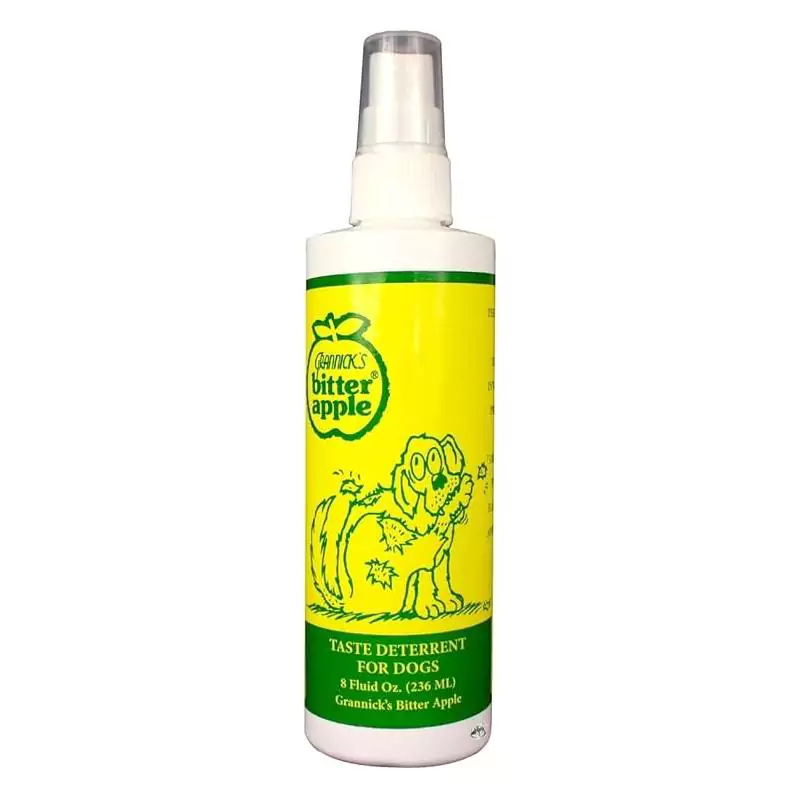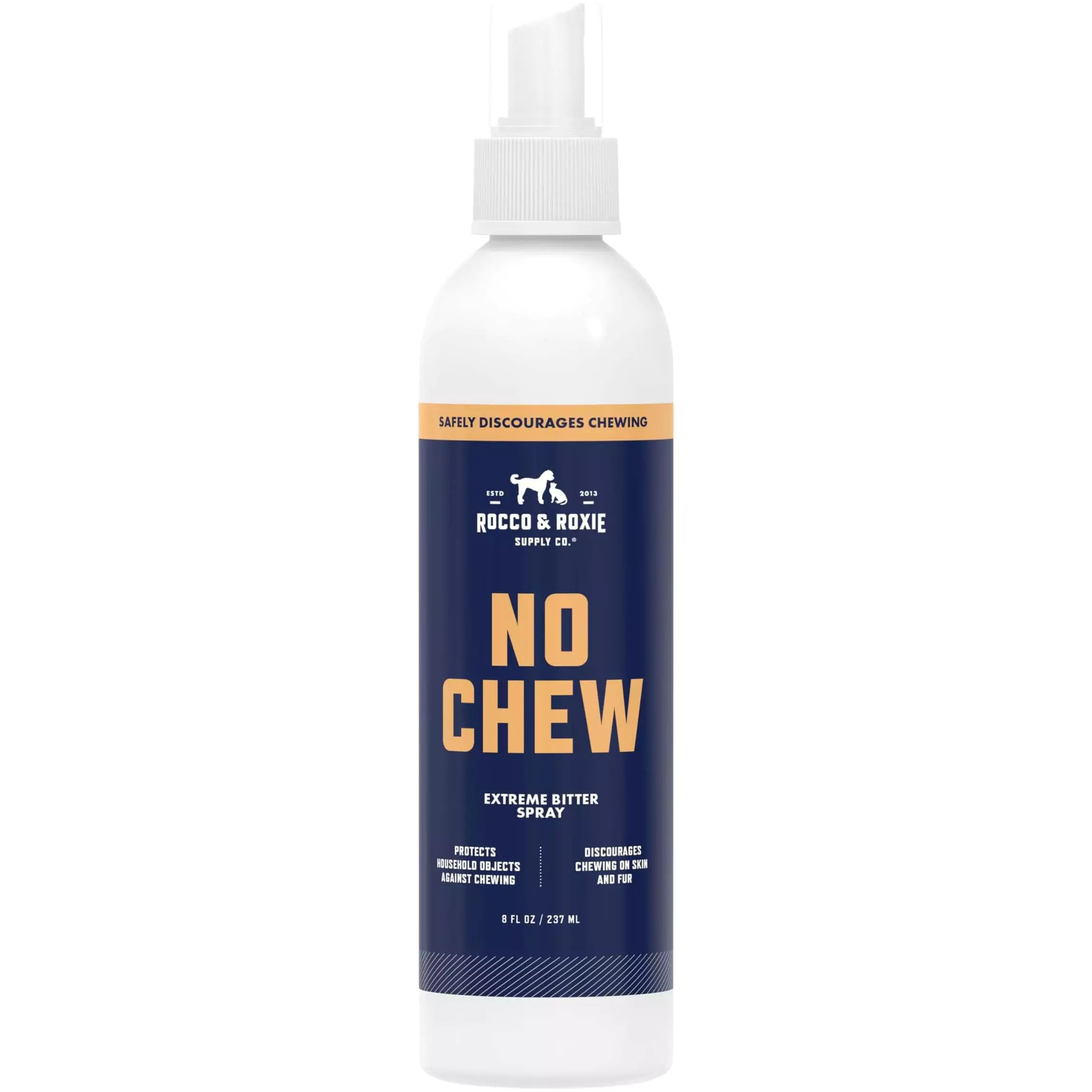Last updated on:
September 16, 2025
What Is Anti-Chew Spray?
Anti-chew spray is a deterrent product that uses bitter or unpleasant tastes to discourage dogs from chewing furniture, shoes, and other household items. These sprays work by making objects taste bad to your dog while remaining safe for both pets and humans.
The spray creates a negative association with chewing specific items. When your dog tries to chew something treated with the spray, the bitter taste teaches them to avoid that object in the future.
How Anti-Chew Spray Works
Dogs explore the world through their mouths. Puppies chew while teething, and adult dogs may chew due to boredom, anxiety, or habit. Anti-chew sprays interrupt this behavior by making the experience unpleasant.
Most sprays contain bittering agents that create an extremely bitter taste without causing harm. The key is consistency - you must reapply the spray regularly until your dog learns to avoid the treated items.
Some sprays also include calming ingredients. Products with copaiba oil can soothe hot spots while deterring chewing behavior.
Types of Anti-Chew Sprays
Alcohol-Based Formulas
Traditional anti-chew sprays often contain alcohol as a base. These formulas evaporate quickly and may require frequent reapplication. The alcohol can also be harsh on fabrics and may cause irritation to sensitive dogs.
Alcohol-Free Formulas
Alcohol-free formulas work longer than alcohol-based versions because they don't evaporate as the alcohol dries. These products are gentler on fabrics, furniture, and your dog's skin.
Natural Ingredient Sprays
Natural options, like bitter apple or cayenne pepper, are popular because they're safe for dogs and less likely to cause irritation. These sprays often use plant-based bitter compounds and essential oils.
Key Ingredients to Look For
Safe Bitter Agents
The most effective sprays use proven bitter compounds that are safe for pets. Look for products that list their specific bittering agents rather than vague terms like "natural flavors."
Water Base
Deionized water acts as a safe and gentle base in quality anti-chew sprays. This provides a stable foundation for the active ingredients without adding harsh chemicals.
Stabilizing Compounds
Citric acid helps maintain the stability of the formula, ensuring the product remains effective over time. This ingredient also adds to the unpleasant taste that deters chewing.
Beneficial Additives
Some sprays include ingredients that provide extra benefits:
- Tea tree oil for its natural properties
- Copaiba oil for soothing irritated skin
- Citronella extract as a natural deterrent
Ingredients to Avoid
Alcohol
While not dangerous in small amounts, alcohol can be harsh on fabrics and may cause skin irritation. Alcohol-free formulas have no harmful side effects on you and your dog.
Propylene Glycol
This common preservative can cause skin irritation in sensitive dogs. Look for products that specifically state "No propylene glycol" on their ingredient list.
Artificial Preservatives
Harsh chemical preservatives can cause allergic reactions. Natural preservatives are gentler and just as effective at maintaining product stability.
Unknown Chemical Compounds
Avoid products that don't clearly list their ingredients. Quality sprays don't contain harmful chemicals or ingredients commonly found in other anti-chew sprays.
Our Top Anti-Chew Spray Recommendations
Best Overall - Grannick's Bitter Apple Spray

Price Range: $8-12 for 8oz bottle
Key Features: Non-toxic formula, veterinarian recommended, no staining
Best For: General purpose deterrent for mild to moderate chewing
Developed by a pharmacist and often recommended by veterinarians and groomers, Grannick's Bitter Apple has been the market leader for over 60 years. The formula is harmless to dogs and doesn't leave stains, making it safe for furniture, fabric, and other household items.
The spray works immediately upon contact and has no odor for humans. Many users report success within the first few applications. The bitter taste is strong enough to deter most dogs without being harsh on sensitive skin.
Best for Persistent Chewers - Rocco & Roxie No Chew Extreme Bitter Spray

Price Range: $12-18 for 8oz bottle
Key Features: Alcohol-free formula, twice as bitter, contains copaiba oil
Best For: Heavy chewers and dogs with sensitive skin
This spray is formulated to be twice as bitter as standard deterrents, making it ideal for determined chewers. The alcohol-free formula is safe for direct use on pets' skin and wounds, and includes calming copaiba oil for added skin benefits.
The extra-strength formula works well on dogs that have developed tolerance to milder sprays. Users report high success rates even with aggressive chewers, and the copaiba oil helps soothe irritated skin.
Most Versatile - Fooey Ultra-Bitter Training Aid Spray

Price Range: $10-15 for 4oz bottle
Key Features: Multi-pet formula, neutral pH, safe for direct skin application
Best For: Multi-pet households and versatile training needs
Fooey spray works for dogs, cats, horses, rabbits, birds, and ferrets, making it perfect for multi-pet households. The ultra-bitter taste and versatile application make it stand out among training aids.
The neutral pH formula is gentle enough for direct skin application, making it useful for addressing wound licking and hot spots. Pet owners appreciate the multi-purpose nature and the fact that one product works for all their pets.
Safety Considerations
Pet Safety
Choose products specifically designed for dogs. Human-grade bitter sprays may contain ingredients that are toxic to pets. Always read the ingredient list and look for pet-safe certifications.
Skin Sensitivity
Quality sprays are gentle on skin and won't cause irritation even with regular use. Test a small area first if your dog has sensitive skin or existing skin conditions.
Accidental Ingestion
While anti-chew sprays are designed to be safe if licked, avoid products with warning labels about ingestion. If accidental ingestion occurs, consult a health professional immediately.
Surface Compatibility
Ensure the spray is safe for the surfaces you plan to treat. The best products are kind to all sorts of fabric, fur, and furniture— including drapes, shoes, and electrical cords.
Application Tips
Proper Coverage
Spray evenly over the entire area you want to protect. Dogs will simply move to untreated sections if you miss spots. Allow the spray to dry completely before allowing your dog access to the area.
Consistency Is Key
Apply the spray daily until your dog learns to avoid the treated items. This process typically takes 1-2 weeks with consistent application.
Reapplication Schedule
Most sprays need daily reapplication during the training period. Some long-lasting formulas may work for 2-3 days, but daily application ensures maximum effectiveness.
Ventilation
Use sprays in well-ventilated areas to prevent the bitter smell from becoming overwhelming. Open windows or use fans while applying the product.
What to Expect
Timeline for Results
Most dogs show reduced chewing behavior within 3-5 days of consistent spray use. Complete behavior change typically occurs within 2-3 weeks.
Success Rates
Different products have varying success rates, with some achieving 50% effectiveness in testing. Individual results depend on your dog's personality, the severity of the chewing problem, and consistency of application.
Training Integration
The best results occur when anti-chew spray is used with a comprehensive training program. Combine the spray with positive reinforcement training for permanent behavior change.
Choosing the Right Product
Consider Your Dog's Needs
Puppies may need gentler formulas, while determined adult chewers might require stronger concentrations. Dogs with sensitive skin should use natural, alcohol-free options.
Evaluate the Chewing Problem
Light chewers may respond well to basic bitter apple formulas. Heavy chewers need stronger, more persistent products with multiple deterrent compounds.
Check Surface Requirements
Different sprays work better on different surfaces. Fabric-safe formulas are essential for upholstery, while stronger formulas may be needed for wooden furniture.
Read User Reviews
Look for products with consistent positive reviews from dog owners facing similar chewing problems. Pay attention to comments about effectiveness duration and reapplication frequency.
Budget Considerations
Price Range
Anti-chew sprays typically cost $8-25 for an 8-16 oz bottle. Higher-priced products often contain better ingredients and last longer per application.
Cost Per Use
Calculate the true cost based on how often you need to reapply the product. A more expensive spray that works longer may cost less per use than a cheap option requiring multiple daily applications.
Money-Back Guarantees
Some manufacturers offer unconditional guarantees, promising to refund your purchase if you're not satisfied. These warranties indicate confidence in product effectiveness.
Alternative Solutions
DIY Options
You can make basic anti-chew spray using bitter apple extract, water, and vinegar. However, commercial products are often more effective and longer-lasting.
Training-Only Approach
Some dog owners prefer to rely entirely on positive reinforcement training without using deterrent sprays. This method requires more time and consistency but avoids chemical products entirely.
Physical Barriers
Baby gates, crate training, and removing tempting items can prevent chewing without using sprays. Combine these methods with anti-chew spray for best results.
Common Mistakes to Avoid
Inconsistent Application
Skipping days or forgetting to reapply reduces effectiveness. Create a daily routine to ensure consistent use during the training period.
Insufficient Coverage
Spraying only the most damaged areas allows dogs to find new chewing spots. Treat the entire object or area you want to protect.
Giving Up Too Soon
Some dogs need several weeks to break established chewing habits. Continue using the spray even if you don't see immediate results.
Using Expired Product
Old anti-chew spray loses effectiveness over time. Check expiration dates and replace products that have been stored for extended periods.
Professional Recommendations
Veterinarians and professional dog trainers recommend starting with alcohol-free, natural ingredient formulas. These products provide effective deterrence without risking skin irritation or other side effects.
For persistent chewing problems, consider consulting a professional dog trainer who can help identify the root cause of the behavior and create a comprehensive solution plan.
Final Thoughts
Anti-chew spray is an effective tool for protecting your belongings and training your dog to avoid destructive chewing. Choose alcohol-free formulas with natural ingredients for the safest, most effective results.
Remember that anti-chew spray works best when combined with proper training and environmental management. Be patient, consistent, and positive in your approach to achieve lasting behavior change.
The right product will protect your furniture while keeping your dog safe and comfortable throughout the training process.
You also like our list of Best Dog Clippers for Double-Coated Breeds
![image of a customer service representative (focusing on workspace) [background image]](https://cdn.prod.website-files.com/686ff0f42c677102ebc56fac/68c9e5c4a2729ce6a0c90df4_full-shot-dog-biting-shoe-home-1-68c9e59c2daad.webp)







